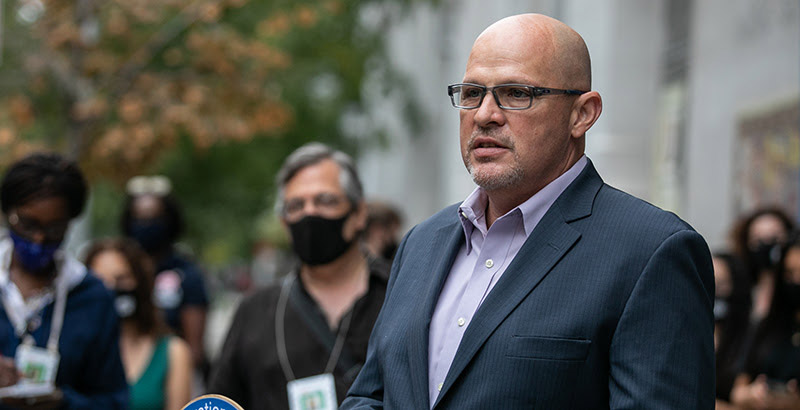Analysis: A Coalition of Opposition Factions Is Looking to End a 60-Year Line of Leadership at NYC’s Teachers Union. Will It Succeed?

Get stories like this delivered straight to your inbox. Sign up for The 74 Newsletter
Mike Antonucci’s Union Report appears most Wednesdays; see the full archive.
A version of this column originally appeared on the EIAOnline blog.
Most American Federation of Teachers locals are run by officers elected as part of a caucus, which is a sort of internal political party. The United Federation of Teachers in New York City has been the exclusive domain of the Unity Caucus for more than 60 years. Now, an election is underway to see if its reign will continue.
An assortment of opposition factions have coalesced to form United for Change. It constitutes the greatest challenge to Unity’s control in UFT history. Whether that will amount to a victory, or even a close contest, is an open question.
Very much on the hot seat is UFT President Michael Mulgrew. He has held the office since 2009, when Randi Weingarten resigned to assume full-time duties as president of AFT.
Mulgrew and Unity have always been able to rely on the retiree vote, leading to large margins of victory in previous elections. This time, however, a significant group of retirees are angry because of a UFT-approved plan to move them from traditional Medicare into Medicare Advantage programs. A judge issued an injunction against the plan, and later sent it back to the city for revisions that would have eliminated the predicted cost savings, essentially killing it.
Even so, many retirees are furious. Mulgrew was forced to cancel a UFT event because protesters were planning to show up.
You can go to each caucus’s website or social media pages to get the platforms, claims and official positions, but I suggest you take a look at two sites run by longtime union activists.
NYC Educator is the home of Arthur Goldstein, a former member of the opposition and one-time fierce critic of the Unity Caucus and what he has referred to as its “loyalty oath.” He now sits on the union’s executive board and is running for re-election with Unity. Back in 2018, the opposition caucus he worked with staged a sort of a purge, leading to his disillusionment.
Goldstein is a reliable voice for Unity’s positions, but he is not its mouthpiece. If you want a reasonable view of the union’s environment from the Unity side, he is essential reading.
On the other side is the everlasting Norm Scott, who created Ed Notes in print form in 1997, making it the most momentous year in the history of teacher union coverage. Scott taught in the city’s schools for more than 30 years and remains the living memory of UFT and its evolution to this very day.
Scott is deeply involved with United for Change, as he has been with just about every opposition movement that has arisen within the union over the past 25 years. He is reliably left-wing, but, like Goldstein, is no one’s mouthpiece. Before anyone, Scott recognized that it was critical for the union’s splintered caucuses to unite in opposition, but at the same time he recognizes how fragile a coalition of dissimilar factions is.
My own reading of the situation is that Unity will triumph. The big question is how both sides will react to a close contest. Will the opposition build on it or fracture? Will Unity reform or clamp down?
All of this is inside baseball, but the union’s internal dynamics have a monumental effect on how it deals with the city, the schools and the public. It bears watching, and NYC Educator and Ed Notes Online are the best viewing spots.
Get stories like these delivered straight to your inbox. Sign up for The 74 Newsletter

;)